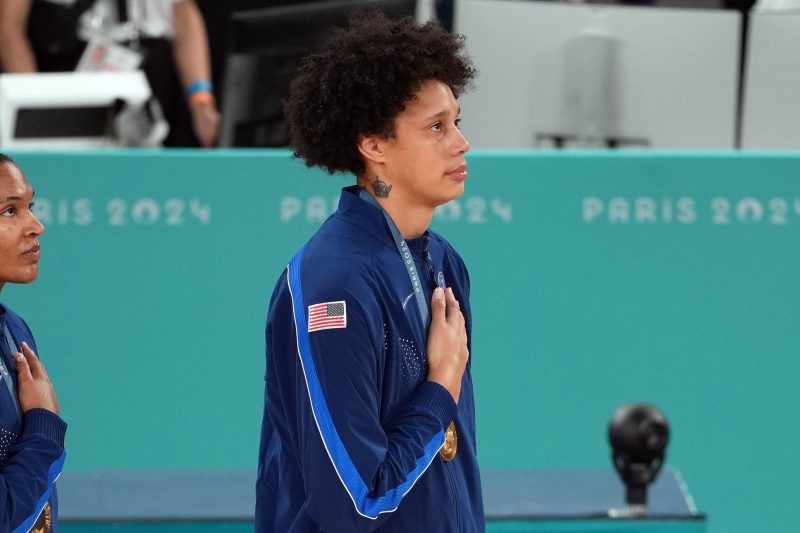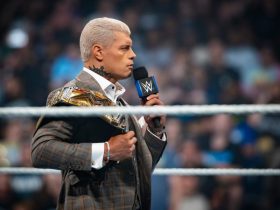PARIS — Brittney Griner’s eyes began to fill as she heard the first notes of the Star-Spangled Banner. As she watched the U.S. flag rise, she cried unabashedly.
It wasn’t long ago she was in a Russian prison, uncertain of when – or if – she’d get back home. Now, as she stood on the top step of the medals podium, the gold medal she helped win for her country heavy around her neck, Griner was overcome with emotion.
By the time the anthem finished, her face was wet with tears. While her teammates huddled together and began cheesing for photos, Griner took a second to compose herself, swiping at her face with her hand before she joined them.
“It means so much to me,” Griner said, her voice growing thick once again. “I didn’t think I’d be here, like I’ve said before. And then to be here winning gold for my country, representing, when my country fought so hard for me to even be standing here – yeah, this gold is going to hold a special place.”
Griner’s story is known to most everyone by now. Arrested in February 2022 after two nearly-spent vape cartridges with hash oil were found in her bag, she spent almost 10 months in a Russian prison. Though marijuana in any form is illegal in Russia, Griner was a political pawn.
Arrested just days before Russia’s unprovoked invasion of Ukraine, she was a propaganda gold mine for Vladimir Putin in his cold war with the United States. A valuable bargaining chip, too.
In her book, Griner details how dehumanizing and demoralizing her imprisonment was. What kept her going was the love of her family, her basketball family included.
Though Griner said when she returned that she planned to play again, re-entry was not easy. Physically or psychologically. Even here in France, her first trip overseas since her December 2022 release, there were flashbacks.
The first train ride to Lille, where the U.S. women played their group-stage games, was hard. The last time she’d been on a train it was to travel between prisons in Russia.
“BG’s gone through a lot the last few years,” said Diana Taurasi, who is Griner’s teammate with the Phoenix Mercury and one of her closest friends. “When you talk about literally where she was (almost) three years ago, it’s almost mind boggling that she’s been able to get back to this point. It shows a lot of character.’
There is something healing for Griner in basketball, though. The affection from her teammates and players from other countries is genuine. After the U.S. women beat Australia in group play, Aussie legend Lauren Jackson sought Griner out in the mixed zone and they exchanged a long hug.
It was the first time the three-time WNBA MVP had seen Griner since her release.
“We did follow it. It was on the news every day, it was horrible,” Jackson said. “I feel really honored that I got the opportunity to match up with her again, even for a couple minutes. She’s a beautiful human.”
There are those who’ve tried to paint Griner as anything but, suggesting she somehow deserved the fate she got. Or, worse, was ungrateful to her country. Nothing could be further from the truth, as those who actually know her know.
Griner let it be known soon after she returned that she wanted to play for USA Basketball again. She is a mainstay of the national team, having already won gold medals in Rio de Janeiro and Tokyo, and putting on the uniform again was the best way she knew to express the gratitude she feels for the United States.
She delighted being around her teammates, who relished the joy she had at these Olympics. She’s a friendly and fun presence in any locker room, a quality desperately needed on a stage like this and with massive expectations for the U.S. women.
But there is a burden she carries that no one else can understand. After the final whistle, Griner found wife Cherelle. Then, while her teammates were still celebrating, Griner went backstage and found a bathroom, where she let all of the emotions wash over her.
“When you see BG around the team, outward, she’s OK. But you know inside, there’s a lot going on there,” U.S. coach Cheryl Reeve said. “But she always presents her very best version of herself, despite all that she went through.
“And she is thankful to be here. She was so thankful to be here.’
Olympians always talk about the pride they have of representing their country, the privilege of wearing the red, white and blue.
For Griner, though, there is gratitude most of all.
“I always wanted to be here,” she said. “My country fought for me to get back. I was able to bring home gold for my country. There’s just no greater feeling.”
Follow USA TODAY Sports columnist Nancy Armour on social media @nrarmour.






